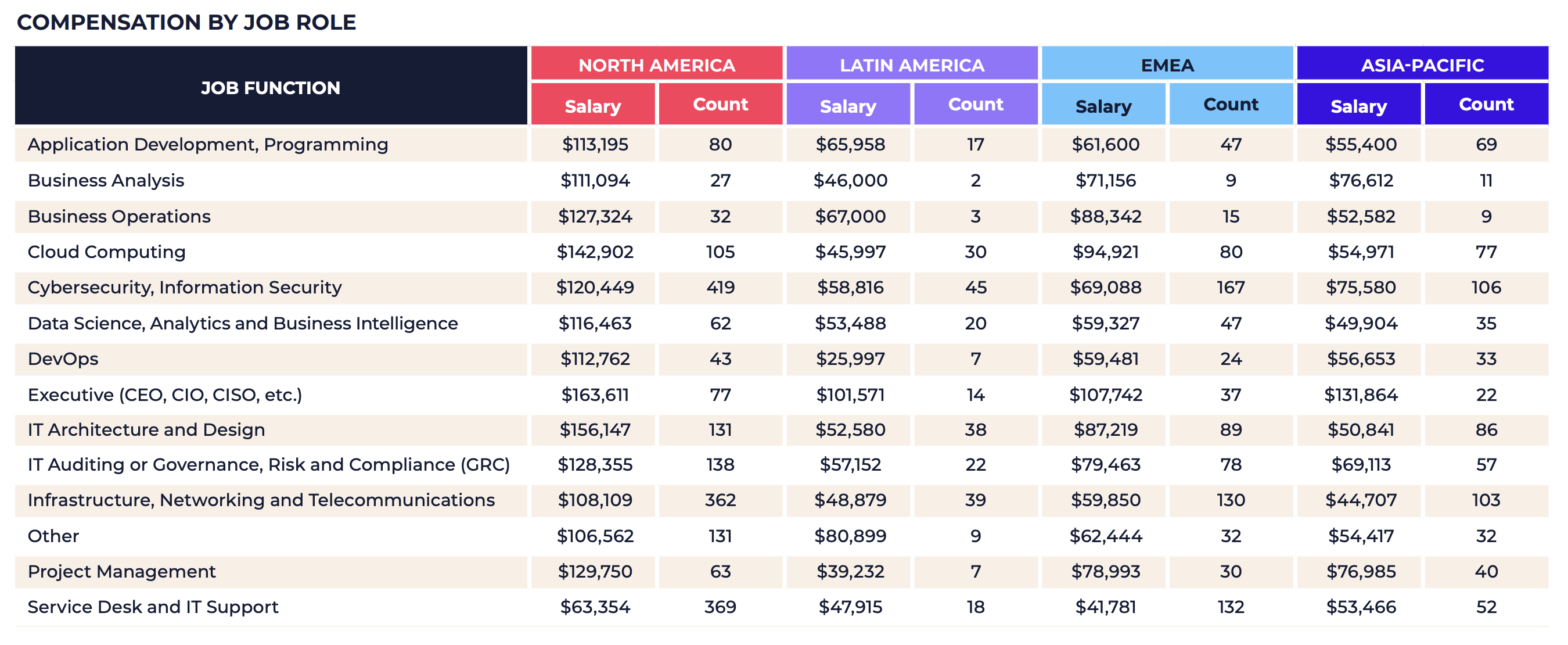
Tech Salaries Climbed 5% Thanks to Earning Skills and Certifications
TL;DR
- The Report — Skillsoft’s latest IT Skills and Salary Report shares the results of a survey of 5,100+ tech professionals worldwide, including findings on compensation trends, job security, and satisfaction.
- The Key Takeaways — Skillsoft found that investments in AI remain strong and ongoing, with more feeling the positive effects of the technology. Many also feel good about their job security, reporting high satisfaction. Yet, more are eying a job change this year.
- Salaries and Certifications — IT professionals worldwide report making 5% more than last year on average. Professionals in the Latin American and Asia-Pacific regions saw the highest raises. Most were bonus-eligible this year, with some exceptions.
- Where to Get the Report — Find the whole 55-page report here:
5,191 professionals participated in Skillsoft’s annual IT Skills and Salary survey this year, resulting in a 55-page report that shares the findings.
The report — now in its 19th year — has a long history of tracking IT professionals’ feelings toward job security, job satisfaction, learning and development, compensation and certifications, and more.
Over time, the Global Knowledge and Skillsoft teams report on different aspects of the report, calling out new and continuing trends.
Here, we’ll cover the highlights of the Salary and Certifications sections of the report.
What’s the Latest in Tech Salary Trends?
In the survey, the Skillsoft team asks respondents to share their current and last year’s salaries. This allows us to see how much salaries rise or fall.
The survey showed that IT professionals worldwide earned an average of 5% more than last year. The worldwide average of IT professionals was $88,448 this year.
Who’s Earning the Most?
Across regions, those in North America still report the highest salaries. This has been true for as long as we’ve done this report. In North America, the average salary was $113,211. Those in management make, on average, $134,235, whereas those who are individual contributors bring in $102,340.
Those in Europe, the Middle East and Africa averaged $70,876. In Latin America, $57,724. In Asia-Pacific, $63,477.
While those in Latin America and Asia-Pacific countries averaged lower than their peers elsewhere, they saw the highest raises this year.
Here’s how the different regions fared this year:
- North America – 5%
- Europe, Middle East and Africa – 4%
- Asia-Pacific – 6%
- Latin America – 9%
For the most part, professionals were eligible for a raise last year. However, IT professionals — those who don’t manage a team or budget — in North America and Europe, the Middle East, and Africa were in the minority when it came to bonus eligibility.
Similar to previous years, those with more career experience and responsibility tend to earn more than those with less. For example, executives in North America make almost double what individual contributes make — on average.
The domain of the role also plays a part. In North America, those who work in cloud computing averaged more than $142,000 a year. The highest paying roles in Europe, the Middle East and Africa, Latin America, and Asia-Pacific including:
- Application Development
- Business Analysis
- Business Operations
- IT Architecture and Design
- Project Management

Many additional factors affect a professional’s salary, too. Location is another. This year, you can see how salaries fluctuate by U.S. state, Canadian province, or European country.
But what else helps professionals earn a little extra?
What’s Helping Pros Earn More and Land Jobs?
The most common reason for earning more is job performance. In other words, professionals were recognized for doing good work and were rewarded for it.
But what else? Here’s what respondents reported:
- Standard company increase
- Developed new skills
- Earned a new certification
- Cost-of-living increase
- Promotion within the company
People also cited taking on more responsibility or completing various assignments in their current role. Others said jumping to a new employer help earn them a bump — a move that almost two-thirds are entertaining in the next year.
The main reason people chose to leave their employers in the past year was in pursuit of more money, the survey showed.
If you’re in the market, what will help you land a new job?
The majority (67%) of those who found themselves in the market this past year said their technical certifications appealed to hiring managers. Then, it was technical skills (66%), followed by soft skills (56%), their network (51%), and leadership skills (34%).
This differs slightly from what IT decision-makers said, although not drastically. The highest percentage (75%) said a candidate’s technical skills were the most desirable trait. However, other key considerations were a professional’s work history or experience (57%), their soft skills (56%), and certifications (50%)
What’s the Latest in Certification Trends?
This survey focuses on technical certifications. While rigorous and sometimes costly to obtain, these credentials can result in a substantial return on investment for both individuals and their employers.
For example, IT leaders overwhelmingly recognize the tangible benefits of having certified staff on payroll. They say these professionals are more productive at work, quicker to resolve problems and offer solutions, and alleviate the burden of skill gaps.
Skill gaps commonly increase teams' stress. They also expose organizations to more security risks, slow down project times, and even impact customer satisfaction and revenue.
This is a big deal as two-thirds of IT leaders say they can recognize skill gaps on their teams, with some of the worst in areas of great demand, like artificial intelligence.
And that’s why certifications become so valuable.
When IT leaders and hiring managers assess a candidate, there are few other credible validations of one’s skill set beyond a certification — especially a certification from a reputable provider.
The assurances alone warrant added value, but leaders recognize these professionals bring more to the table than those without. And they’re willing to pay for it.
Which Pay the Most?
As mentioned earlier, pay will vary because of many factors. Where one resides can have a great impact on earnings, as we see in the report.
Around the world, these are the highest-paying certifications:
- Worldwide – ISSMP Information Systems Security Management Professional earns professionals on average $188,291.
- North America – AWS Certified Security - Specialty earns professionals on average $202,959.
- Latin America – CISM - Certified Information Security Manager earns professionals on average $134,025.
- Europe, Middle East and Africa – Microsoft Certified: Azure AI Engineer Associate earns professionals on average $110,871.
- Asia-Pacific – CISM - Certified Information Security Manager earns professionals on average $111,346.
Historically, certifications that validate a professional's skills in these areas tend to command generous salaries: cybersecurity, governance, risk and compliance, and cloud computing. This year, that proved true again.
What’s the Future of Certifications Look Like?
Of those who participated in the survey, 93% hold at least one technical certification. And this group is ambitious.
Many have their sights set on an array of certifications from providers such as Microsoft, AWS, CompTIA, Google Cloud, ISC2, and several others.
These are the certifications most plan to pursue in the year ahead:
- CompTIA’s Security+
- ISC2’s CISSP – Certified Information Systems Security Professional
- AWS Certified Cloud Practitioner
- CompTIA’s Network+
- CompTIA’s CySA+ (Cybersecurity Analyst)
For anyone in leadership who’s struggled to hire cybersecurity talent, this list may come as good news. Cybersecurity, as shown in the survey, is the toughest area for hiring talent and still one of the leading priorities of those in leadership.
The certifications above would undoubtedly help in that area. CompTIA’s Network+, Security+ and CySA+ all help build vendor-neutral skills that are relevant and widely applicable.
ISC2’s CISSP is a gold standard security credential for those in leadership and responsible for security operations.
AWS’ Certified Cloud Practitioner would appeal to many who’ve invested in AWS and need to ensure they configure their environment properly.
Want to Know What Else We Found? Get the Report Today
The IT Skills and Salary Report provides a wealth of data to dig into.
For those in leadership, you can learn about how your peers worldwide plan to bridge skill gaps and invest their resources.
For learning and development professionals, it’s a detailed resource to learn how technical professionals value learning and choose to build new skills.
For technical professionals — from the help desk to cloud architects — this report may help chart out your career, which certifications are worth your while, and where your pay stands in comparison to others.
You can find the report today here:


